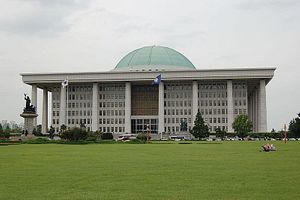Last November, I raised the prospect of South Korea’s center-right Saneuri Party splitting. Sure enough, at the end of the year, 30 of Saneuri’s National Assembly members announced that they were defecting to form the New Conservative Party for Reform, now known as the Barun Party. Their formation of a new party introduces further uncertainty to the country’s political environment, which will impact this year’s presidential election and the long-term prospects for the country’s center-right.
On the surface, it seems that Barun will split the center-right vote and hand the election to the center-left Minjoo Party. A recent poll conducted by Real Meter shows Barun’s support rating at 13.4 percent and Saneuri’s at 12.2 percent, for a combined rating of 25.6 percent. Their combined rating is behind Minjoo’s 37.6 percent; that deficit can be attributed to President Park Geun-hye’s impeachment tainting the center-right as much as it can be to genuine support for the center-left. If anything, current polling suggests voters are looking for alternatives to the status quo and aren’t as concerned about the ideology those alternatives present.
To make matters worse, Saneuri’s never-ending infighting continues to cause problems for the center-right. Upon taking office in late December, interim Saenuri chairman In Myung-jin called for a purge of Park loyalists from the party. Thus far, they have refused to budge and vowed to maintain their party memberships. Barun has exploited this tension, calling for the dismantlement of Saenuri altogether. The ongoing soap opera does nothing but garner negative headlines and hinders the center-right from presenting a forward-looking message to the electorate. Voters don’t want to hear about political drama; they want to hear about policy solutions that will improve their lives.
Recent events may lead one to conclude that the center-right’s prospects in the upcoming election are terminal. However, politics is rarely that simple. Two data points provide encouragement for Barun and the center-right at-large: the overwhelming approval of Barun’s formation and prospective presidential candidate Ban Ki-moon’s competitiveness. Sixty-two percent of voters approved of Barun’s split from Saenuri, which indicates voters are still open to supporting a center-right party. The same poll showed Ban neck-and-neck with Minjoo’s Moon Jae-in in a three or four-way presidential race. Ban’s numbers may drop in the coming days because of a corruption scandal involving two of his family members, but he can be expected to bounce back quickly.
Additionally, Barun has room to grow. While only 30 of Saneuri National Assembly members have defected so far, over 60 of them voted to impeach Park, indicating that further defections are likely after Barun’s formal launch on January 24. Overlaying this is Ban’s return to the country after serving ten years as secretary-general of the United Nations. While he has not declared if he would create his own party or join an existing party to run for president, the latter seems to be a more likely outcome. If Barun can recruit him as their candidate, they will become the standard bearer for the center-right at Saenuri’s expense.
Saneuri may find it impossible to distance themselves from Park, irrespective of any belated reform attempts. After all, a majority of their National Assembly members voted to keep Park, whom has a subterranean approval rating of 4 percent, in office. It’s an understatement to say this tainted Saenuri in the eyes of the electorate, and it seems that their support rating will continue to decline as Barun’s increases. With that in mind, the prospect of Saenuri dissolving as an entity or merging with Barun should not be discounted. While unlikely, this could come about as an attempt to prevent Minjoo from winning the presidency.
The country’s political environment is fluid. Importantly, the election date is uncertain and will be determined by the timing of the Constitutional Court’s ruling on Park’s impeachment. If the court rules for her impeachment, an election will take place within 60 days of the ruling. If it rules against her impeachment, an election is likely to take place in December; that remains a possibility, as Park appointed many of the court’s members. In that event, the country’s political crisis would worsen and see candidates who can paint themselves as representing wholesale change – regardless of ideology – gain more support from voters.
Only time will tell what’s next for the country’s center-right. If a split between Barun and Saenuri continues, Minjoo may very well emerge as the victor. If Barun can consolidate enough of the center-right and earn the support of non-ideological voters looking for change, they can win the election despite a split in the center-right vote. It would make sense for the center-right to completely embrace Barun and disown Saenuri, but the political events of the past few months have made anything but sense.
Parker Novak is the Principal of Red Team Advisory Group, a Washington, DC-based political consulting firm, and is studying for a Master’s degree in Global Advocacy at George Washington University. He earned a Bachelor’s degree in Political Science from The Ohio State University.

































